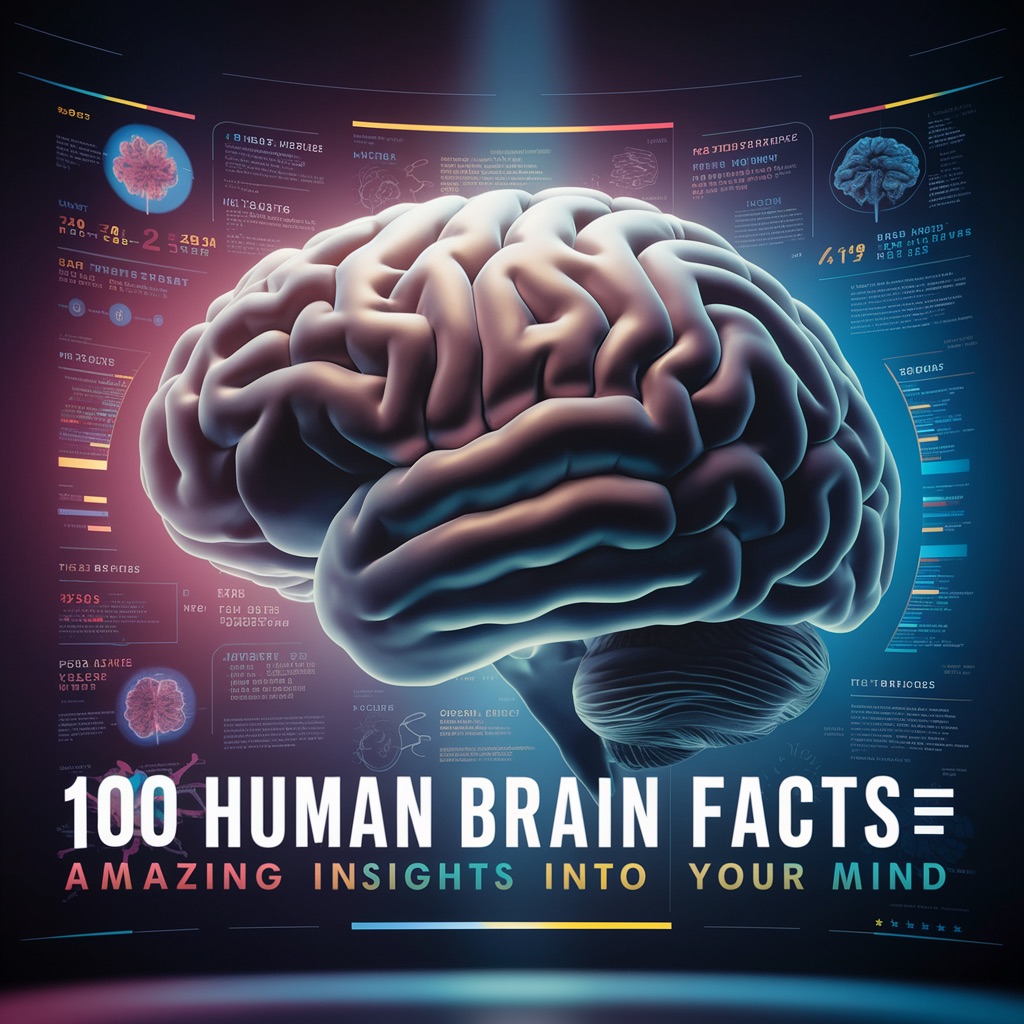The human brain is an astonishing organ, often described as the most complex and powerful structure in the universe. It is responsible for everything we do, from simple daily tasks to the most intricate thoughts and emotions. Understanding the human brain facts can unlock the mysteries of our minds, offering insights into our behavior, creativity, and intelligence.

Despite its relatively small size compared to the rest of the body, the brain consumes about 20% of our energy, highlighting its vital role in our daily functioning. By exploring psychology facts about the human mind, we can better appreciate how our brains work, and how they influence our perceptions and interactions with the world.
This article dives into some amazing brain facts, exploring unknown facets of the brain’s capabilities and how they relate to our daily lives. From its incredible memory capacity to its ability to adapt through neuroplasticity, understanding these facts can help us unlock our potential and lead more fulfilling lives.
Whether you’re fascinated by unknown facts about the brain or seeking practical ways to boost your cognitive abilities, this exploration of the brain will offer both intriguing insights and actionable knowledge. Join us as we uncover the secrets of your most complex organ and learn how to harness its power for personal growth and success.

The Incredible Anatomy of the Human Brain
The human brain is a marvel of biological engineering, boasting an intricate and complex structure that supports every aspect of human life. Comprising billions of neurons and trillions of synaptic connections, the brain is responsible for orchestrating thought, emotion, movement, and memory.
Brain Structure and Functions
The brain is divided into several distinct regions, each with specialized functions:
- Cerebrum: This is the largest part of the brain, responsible for higher cognitive functions like thinking, learning, and memory. It is divided into two hemispheres and further into lobes, each managing different tasks such as reasoning, language, and sensory processing.
- Cerebellum: Located at the back of the brain, the cerebellum plays a crucial role in coordination and balance. It fine-tunes motor activities and ensures smooth execution of movements, like playing a musical instrument or riding a bicycle.
- Brainstem: The brainstem connects the brain to the spinal cord and regulates essential life functions such as breathing, heart rate, and sleep cycles. It acts as a control center for automatic functions necessary for survival.
- Limbic System: This complex system manages emotions and memory formation. It includes the hippocampus, which is key to forming new memories, and the amygdala, which processes emotions like fear and pleasure.

Amazing Brain Facts
Here are some amazing brain facts that highlight the brain’s incredible capabilities:
- The Brain’s Weight: Despite making up just about 2% of body weight, the human brain consumes approximately 20% of the body’s energy, underlining its critical importance in daily functioning.
- Neurons and Synapses: The brain contains roughly 86 billion neurons, each capable of forming thousands of synaptic connections. These connections allow for complex networking that underpins thought and learning.
- Plasticity: The brain’s ability to adapt and change through neuroplasticity is astounding. This feature allows us to learn new skills, recover from injuries, and adapt to changes in the environment.
- Speed of Thought: Neural impulses can travel at speeds up to 268 miles per hour, enabling rapid responses and processing of information.
The intricate design of the brain mirrors how we organize and tidy our physical spaces, where a well-maintained environment can boost productivity and mental clarity. For those interested in enhancing their language skills, consider exploring tidy synonyms to keep things neat and organized, much like our brains maintain order amidst complexity.
Understanding these human brain facts not only fuels curiosity but also inspires us to explore ways to optimize brain health and functionality. As we delve deeper into psychology and neuroscience, we uncover the secrets of how the brain shapes who we are and what we can achieve.

Psychology Facts About the Human Mind
The human mind is a fascinating landscape of thoughts, emotions, and behaviors shaped by the brain’s intricate workings. Understanding the psychology facts about the human mind provides insights into how we perceive the world, make decisions, and interact with others. These insights reveal the underlying mechanisms that drive human behavior and cognition, offering a glimpse into the incredible complexity of our mental processes.
The Science Behind Thoughts and Emotions
Our thoughts and emotions are products of intricate neural networks and biochemical interactions within the brain. Here are some intriguing facts that illustrate how psychology and neuroscience intersect:
- Emotional Processing: The amygdala, part of the limbic system, plays a critical role in processing emotions such as fear and pleasure. It helps us respond to emotional stimuli and is linked to memory formation, especially for emotionally charged events.
- Memory and Learning: The hippocampus is essential for forming new memories and retrieving old ones. It allows us to learn new information and recall past experiences, acting as a memory center within the brain.
- Decision-Making: The prefrontal cortex governs decision-making, impulse control, and complex thought processes. This region helps us weigh options, consider consequences, and make informed choices.
- Perception and Reality: Our perceptions are shaped by sensory information processed in the brain, but they can be influenced by biases and prior experiences. This phenomenon highlights the brain’s role in constructing our subjective reality.
Amazing Brain Facts about Human Psychology
Here are some amazing brain facts that shed light on psychological processes:
- The Power of Habit: Habits are formed through repeated neural pathways that become ingrained over time. The basal ganglia, a group of structures deep within the brain, are responsible for habit formation, illustrating the brain’s ability to automate behaviors.
- Mirror Neurons: These neurons fire both when we perform an action and when we observe others performing the same action. This mechanism is believed to be the foundation of empathy and social learning, allowing us to understand and mimic others’ actions.
- The Negativity Bias: Our brains are wired to prioritize negative information over positive, a survival mechanism that has evolved to help us avoid danger. This bias affects our attention, memory, and decision-making, often leading us to focus more on negative experiences.
- Attention Span: The human brain is capable of incredible focus, but its attention span can be surprisingly short. On average, people can focus on a task for about 20 minutes before their attention starts to wane.
Understanding these psychological phenomena allows us to harness the mind’s power for personal development and growth. For instance, by being aware of the negativity bias, we can consciously practice gratitude and positive thinking to balance our perspective.
The Connection Between Environment and Mind
The environment plays a crucial role in shaping mental processes and well-being. A tidy, organized space can boost mental clarity and focus, enhancing productivity and reducing stress. Similarly, reducing your carbon footprint at homecan create a healthier living environment, promoting well-being and mental peace.
Creating a positive environment supports cognitive function and emotional health, helping the brain operate at its best. By understanding these psychology facts about the human mind, we can make informed choices to improve mental health and enhance our quality of life.

Unknown Facts About the Brain’s Functionality
The human brain is a marvel of complexity and adaptability, capable of feats that often go unnoticed in everyday life. While many people are familiar with basic brain functions, there are countless unknown facts about the brain’s functionality that reveal its incredible capabilities and mysteries. Exploring these lesser-known aspects helps us appreciate the brain’s power and potential.
Neuroplasticity: The Brain’s Ability to Adapt
One of the most fascinating aspects of the brain is its ability to adapt and change throughout life, a phenomenon known as neuroplasticity. Here are some insights into how neuroplasticity works:
- Neural Rewiring: Neuroplasticity allows the brain to rewire itself in response to learning, experience, and injury. This adaptability enables us to acquire new skills, recover from brain injuries, and adapt to changing environments.
- Learning and Memory: Every time we learn something new, the brain forms new neural connections and strengthens existing ones. This process enhances memory retention and cognitive function, illustrating the brain’s remarkable capacity for growth.
- Recovery from Injury: Neuroplasticity plays a critical role in recovery after brain injuries, such as strokes. Through rehabilitation and targeted exercises, the brain can reorganize itself to compensate for lost functions, demonstrating its resilience.
The Brain’s Hidden Processes
Beyond its adaptability, the brain performs numerous hidden processes that contribute to our daily lives. Here are some amazing brain facts about these functions:
- Subconscious Processing: A significant portion of brain activity occurs at a subconscious level, processing information without our conscious awareness. This subconscious activity influences decision-making, emotions, and behavior.
- Automaticity: The brain can automate routine tasks, allowing us to perform them without conscious effort. This ability frees up cognitive resources for more complex tasks, enhancing efficiency and productivity.
- Sleep and Memory Consolidation: During sleep, the brain consolidates memories and processes information gathered throughout the day. This process is crucial for learning and long-term memory retention, highlighting the importance of sleep for cognitive health.
- The Power of Imagination: The brain’s ability to imagine and create is a testament to its incredible versatility. Imagination engages various brain regions, including those involved in sensory perception and emotion, allowing us to visualize scenarios and generate new ideas.
How Decluttering Affects Brain Functionality
The brain’s functionality is also influenced by external factors, such as environment and lifestyle. A cluttered environment can overwhelm the brain’s processing capacity, leading to stress and reduced focus. In contrast, decluttering your life can enhance mental clarity and support cognitive function.
By simplifying and organizing our surroundings, we can reduce cognitive load and improve mental well-being. This principle aligns with the brain’s preference for order and efficiency, allowing us to operate at our best.
Embracing the Brain’s Potential
Understanding these unknown facts about the brain empowers us to harness its potential for personal growth and success. By embracing neuroplasticity, optimizing our environment, and leveraging subconscious processing, we can enhance our cognitive abilities and unlock new opportunities.
The brain’s incredible adaptability and hidden processes remind us of the vast potential within each of us. As we continue to explore the mysteries of the mind, we gain valuable insights that can transform how we live, learn, and interact with the world.

Amazing Brain Facts That Will Blow Your Mind
The human brain is a fascinating and complex organ capable of extraordinary feats. While we rely on it for everything we do, many amazing brain facts remain unknown to most people. These facts not only highlight the brain’s incredible capabilities but also offer a deeper appreciation for its complexity and potential.
The Brain’s Processing Power
- Rapid Processing Speed: The brain processes information at an astonishing speed, with neurons capable of firing signals at speeds up to 268 miles per hour. This rapid communication enables quick reflexes and efficient information processing, allowing us to respond to stimuli almost instantaneously.
- Vast Storage Capacity: Although it’s impossible to quantify exactly, estimates suggest that the brain can store up to 2.5 petabytes of data. This is equivalent to approximately three million hours of TV shows, highlighting the brain’s incredible ability to retain and recall information.
- Continuous Activity: Even when we sleep, the brain remains active, performing vital functions such as memory consolidation, toxin removal, and problem-solving. This continuous activity underscores the brain’s role as a perpetual workhorse, tirelessly maintaining our mental and physical health.
Extraordinary Brain Functions
- Synesthesia: This neurological condition causes individuals to experience blended sensory perceptions, such as seeing colors when hearing music or associating numbers with specific colors. Synesthesia demonstrates the brain’s ability to create unique and vivid experiences, blurring the lines between senses.
- Phantom Limb Sensation: Some individuals who have lost a limb report feeling sensations in the missing limb, known as phantom limb sensation. This phenomenon highlights the brain’s complex representation of the body and its ability to maintain connections even after physical changes.
- Mirror Neurons and Empathy: The brain contains specialized neurons called mirror neurons, which fire both when performing an action and when observing others perform the same action. These neurons are believed to play a crucial role in empathy, social learning, and understanding others’ emotions.
- Pattern Recognition: The brain excels at recognizing patterns, allowing us to identify familiar faces, solve puzzles, and navigate complex environments. This ability is a testament to the brain’s adaptability and skill in processing vast amounts of information quickly.
Surprising Brain Defenses
- Blood-Brain Barrier: The blood-brain barrier is a protective shield that prevents harmful substances in the bloodstream from entering the brain. This defense mechanism ensures that the brain remains safe from toxins and pathogens, similar to how norovirus wipes protect against household germs by creating a barrier against harmful invaders.
- Pain Insensitivity: The brain itself does not have pain receptors, meaning it cannot feel pain directly. This is why brain surgeries can be performed while the patient is awake. However, the brain processes pain signals from other parts of the body, making it the command center for managing pain perception.
- Neurogenesis: Contrary to previous beliefs that the brain cannot regenerate neurons, research has shown that neurogenesis (the formation of new neurons) occurs in certain brain regions, such as the hippocampus. This discovery highlights the brain’s capacity for growth and adaptation, even in adulthood.
Harnessing the Brain’s Potential
Understanding these amazing brain facts can inspire us to unlock our potential and explore new possibilities. Whether through enhancing memory, improving emotional intelligence, or fostering creativity, the brain’s capabilities are vast and varied.
By leveraging the brain’s strengths and protecting it with healthy habits and environmental choices, we can optimize our cognitive performance and lead more fulfilling lives. Embracing the mysteries of the mind allows us to tap into the full power of our most complex organ.

Brain Health and Lifestyle
The incredible capabilities of the human brain depend on maintaining its health through a balanced lifestyle. By understanding the connection between lifestyle choices and brain health, we can make informed decisions to optimize cognitive function, enhance memory, and support overall well-being. Here are some key insights into how lifestyle impacts brain health and practical tips for keeping your brain in peak condition.
Nutrition and the Brain
- Brain-Boosting Foods: Certain foods are known to enhance brain function and protect against cognitive decline. Foods rich in omega-3 fatty acids, such as salmon, walnuts, and flaxseeds, support brain health by reducing inflammation and promoting neural growth. Additionally, antioxidants found in fruits like blueberries and vegetables like spinach help combat oxidative stress and support cognitive function.
- Hydration: Staying hydrated is crucial for maintaining brain performance. Dehydration can lead to fatigue, impaired concentration, and memory problems. Drinking enough water throughout the day is essential, and for those with active lifestyles, hydration powder packets can provide a convenient solution to ensure optimal hydration.
Physical Activity and Brain Health
- Exercise and Neurogenesis: Regular physical activity promotes the growth of new neurons through a process known as neurogenesis. Exercise increases blood flow to the brain, delivering essential nutrients and oxygen that support neural health. Activities such as running, cycling, and yoga have been shown to enhance cognitive abilities and reduce the risk of cognitive decline.
- Stress Reduction: Exercise is also a powerful stress reliever. Physical activity triggers the release of endorphins, which are natural mood elevators. Managing stress through regular exercise can prevent the harmful effects of chronic stress on the brain, such as memory loss and decreased cognitive function.
Sleep and Cognitive Function
- The Role of Sleep: Quality sleep is essential for cognitive function and mental health. During sleep, the brain consolidates memories, clears toxins, and rejuvenates itself for the next day. Lack of sleep can impair attention, memory, and problem-solving skills, making it vital to prioritize restful sleep.
- Sleep Environment: Creating a conducive sleep environment can enhance sleep quality. Choosing the right pillow and mattress can prevent discomfort and improve sleep posture, reducing issues like neck pain. If you suffer from neck pain, it might be worth exploring whether your pillow is the culprit and making adjustments to your sleep setup.
Mental Stimulation and Brain Plasticity
- Cognitive Exercises: Engaging in activities that challenge the brain helps keep it sharp and flexible. Puzzles, reading, learning new skills, and playing musical instruments stimulate different brain areas and promote neuroplasticity, allowing the brain to form new connections.
- Social Interaction: Maintaining strong social connections is beneficial for brain health. Interacting with others provides mental stimulation and emotional support, reducing the risk of cognitive decline. Participating in social activities or community events fosters a sense of belonging and supports mental well-being.
Embracing a Brain-Healthy Lifestyle
By incorporating these habits into your daily routine, you can support brain health and unlock the full potential of your cognitive abilities. The key is to embrace a holistic approach that combines nutrition, exercise, sleep, and mental stimulation.
Understanding the relationship between lifestyle and brain health empowers us to make choices that enhance our quality of life and cognitive function. By prioritizing brain health, we can improve focus, boost creativity, and maintain a sharp mind as we age.
The human brain is a fascinating and powerful organ that plays a central role in every aspect of our lives. Through exploring these human brain facts, we gain a deeper appreciation for its complexity and capabilities. From understanding the basics of brain anatomy to delving into psychology facts about the human mind, the insights we gain allow us to appreciate the intricate workings of our minds.

Our journey through the brain has revealed amazing brain facts about its processing power, adaptability, and incredible defenses. We’ve learned about the brain’s remarkable ability to change and adapt through neuroplasticity, its subconscious processing power, and its role in shaping our emotions and perceptions. These insights emphasize the importance of maintaining a brain-healthy lifestyle to unlock the full potential of our cognitive abilities.
By making informed lifestyle choices—such as eating brain-boosting foods, staying hydrated with options like hydration powder packets, engaging in regular exercise, and prioritizing quality sleep—we can enhance our brain health and improve our overall well-being. Understanding the unknown facts about the brain helps us realize that we hold the power to shape our mental and physical health.
As we continue to explore the mysteries of the human brain, it becomes clear that this complex organ is not just a biological marvel but also a source of endless curiosity and potential. The knowledge we gain from studying the brain inspires us to embrace new opportunities for personal growth, creativity, and learning.
In conclusion, by uncovering these human brain facts, we empower ourselves to make choices that enrich our lives and unlock the mysteries of our most complex organ. Embracing the potential of the brain allows us to lead more fulfilling, engaged, and mentally active lives. So, let us take the first step in this fascinating journey of discovery, knowing that the secrets of our minds are within reach, ready to be explored and harnessed for our benefit.
As an Amazon Associate we earn from qualifying purchases through some links in our articles.
